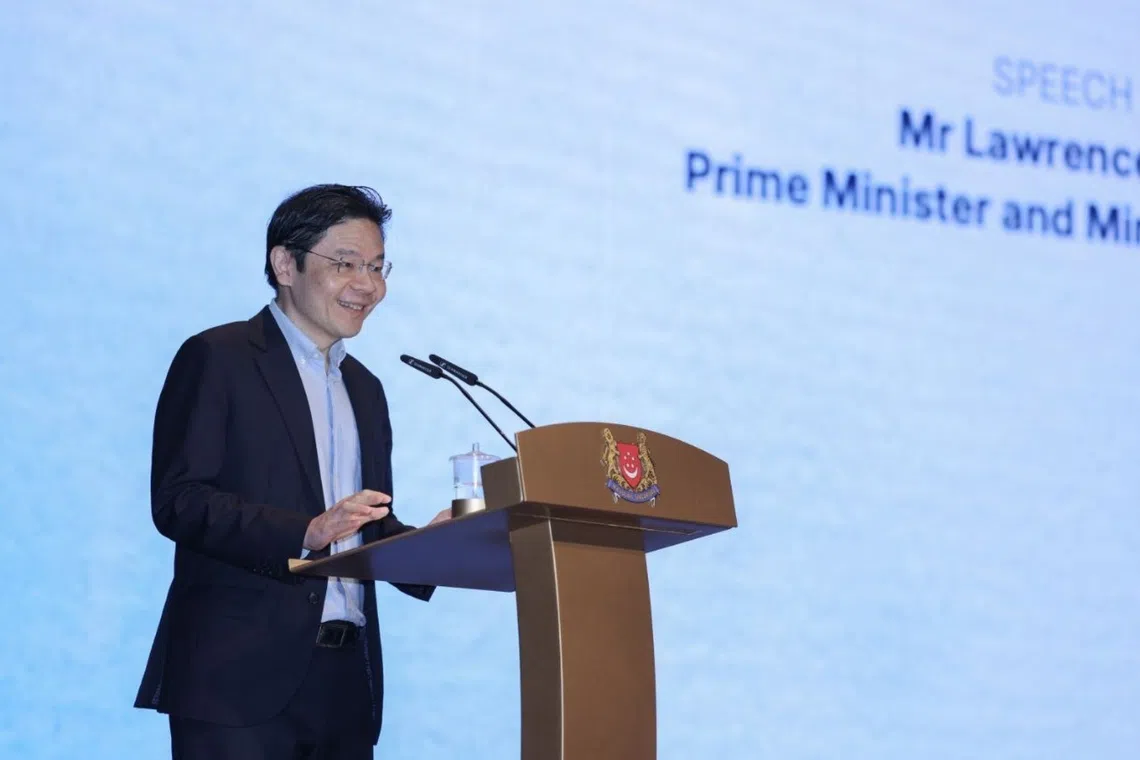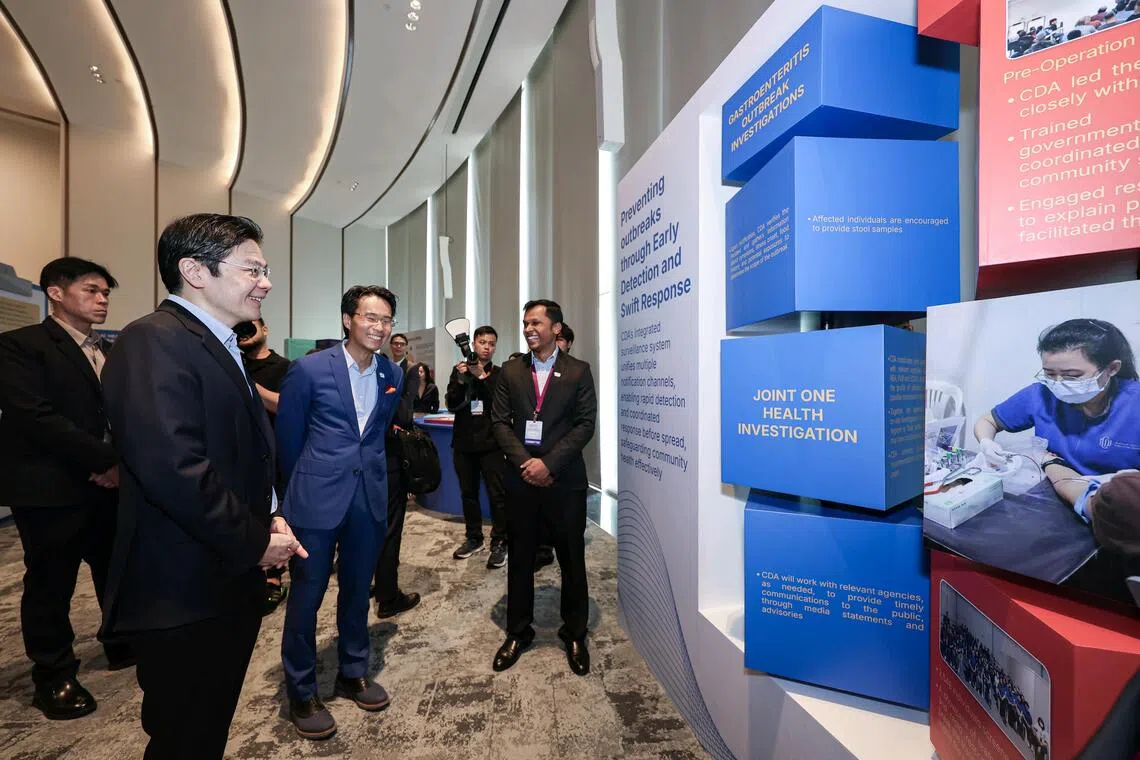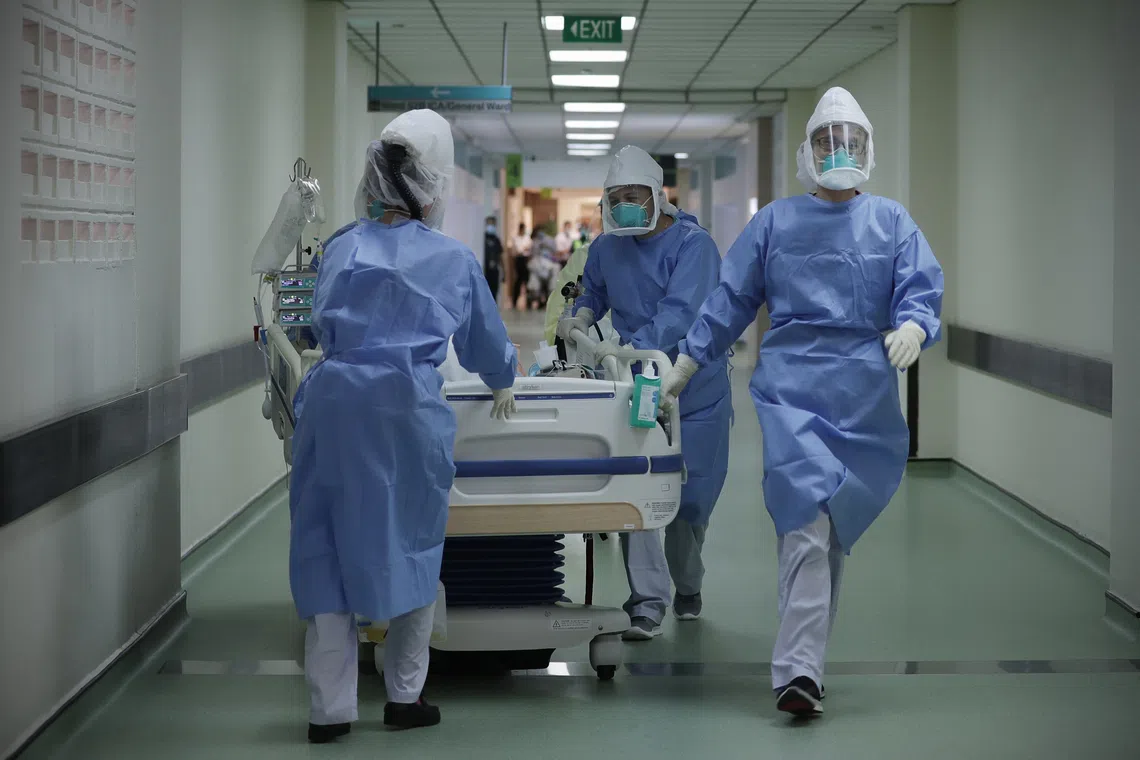New infectious diseases agency to chart Singapore’s new pandemic plans: PM Wong
Sign up now: Get ST's newsletters delivered to your inbox

PM Lawrence Wong likened pandemic preparedness to taking out an insurance policy against future crises, and noted that this always comes at a cost.
ST PHOTO: BRIAN TEO
Follow topic:
SINGAPORE – Singapore’s newest public health agency will take the lead to refresh and update the country’s pandemic plans, said Prime Minister Lawrence Wong.
Speaking at the official launch of the Communicable Diseases Agency (CDA), PM Wong likened pandemic preparedness to taking out an insurance policy against future crises, and noted that this always comes at a cost.
“In good times, people may ask why we are spending so much on insurance,” he said. “But when a crisis hits – the first question is: why didn’t we buy enough insurance?”
PM Wong, who is also Finance Minister, said CDA must therefore strike a careful balance between preparedness and sustainability of resources.
“This requires a dynamic approach – stay alert to emerging risks, and when we see threats building up, be ready to ramp up our buffers and defences,” he said, outlining one of the key tasks of CDA.
“To do so, CDA will work closely with its partners to review our stockpiles, surge capacities and capabilities – to ensure they remain both effective and sustainable.”
In his speech at the NUS University Cultural Centre on Nov 12, PM Wong presented the sobering reality that Covid-19 will not be Singapore’s last pandemic.
“New diseases will continue to emerge, as viruses spill over from animals to humans. In our interconnected and fast-moving world, they can cross borders as quickly as people can,” he said, adding that the next pandemic may come sooner than people expect.
CDA, which comes under the Ministry of Health (MOH), is the first statutory board to be established in six years. The last one was the Home Team Science and Technology Agency, under Singapore’s Ministry of Home Affairs. It was launched in December 2019.

Prime Minister Lawrence Wong, with Communicable Diseases Agency (CDA) chief executive Vernon Lee (wearing blue jacket), touring an exhibition on the agency at the NUS University Cultural Centre on Nov 12.
ST PHOTO: BRIAN TEO
As a statutory board, CDA consolidates the public health and scientific expertise, operational and policy capabilities, and surveillance and analytics skills and systems, which formerly resided across MOH, the National Centre for Infectious Diseases (NCID) and the Health Promotion Board.
PM Wong said Singapore’s journey of constant learning and improvement has served the nation well over the decades.
For instance, the severe acute respiratory syndrome outbreak in 2003 showed the need for a dedicated, modern healthcare facility that could handle highly infectious diseases. It paved the way for NCID, which became fully operational in 2019 and was critical in Singapore’s fight against Covid-19.
The 2019 Covid-19 pandemic, in turn, culminated in a White Paper that documented lessons and recommendations for a more resilient Singapore.
Among the lessons learnt are the need for new capabilities in disease surveillance and data analytics, resource management and forward planning, as well as vaccine logistics and supply chain operations.
Comprehensive and integrated responses across sectors, including healthcare and border control, are also needed to contain the spread of the disease.
Following the release of the White Paper in March 2023,

In his speech at the NUS University Cultural Centre on Nov 12, PM Lawrence Wong presented the sobering reality that Covid-19 will not be Singapore’s last pandemic.
PHOTO: ST FILE
The details were fleshed out days later by Minister for Health Ong Ye Kung during a parliamentary debate on the White Paper.
On Nov 12, PM Wong said: “The CDA cannot fight the next pandemic alone. Covid showed us that pandemics are not just public health issues – they can significantly impact our economy, our society, and the daily lives of every Singaporean.”
Every sector of society was mobilised to fight Covid-19, he said. They included healthcare professionals on the front lines; public officials implementing border controls and safe management measures; enterprises implementing business continuity plans, pivoting operations, and keeping workplaces safe; and community groups mobilising volunteers to care for the elderly and vulnerable.
At the helm of CDA is the former executive director of NCID, Professor Vernon Lee.
Speaking on Nov 12, Prof Lee said Singapore’s connectedness with other countries through trade and travel opens the nation to the risk of importing infectious diseases with the potential to result in outbreaks.
He cautioned that while many diseases are endemic to Singapore, they still need to be well managed to minimise their impact on citizens’ daily lives. These diseases include dengue, influenza, food-borne infections, HIV and tuberculosis.
“Immunisation is key to prevent infections from occurring and to reduce the spread of infectious diseases,” he said, adding that CDA has been steadily enhancing its national childhood and adult immunisation programmes.

(From Left) Communicable Diseases Agency chief executive officer Professor Vernon Lee, Minister for Health and Coordinating Minister for Social Policies Ong Ye Kung, Prime Minister Lawrence Wong, and Ministry of Health director-general of health Kenneth Mak, officiating the launch of the Communicable Diseases Agency at the NUS University Cultural Centre on Nov 12.
ST PHOTO: BRIAN TEO
In September, CDA updated the National Adult Immunisation Schedule to include the Shingrix vaccine, which reduces the risk of shingles, and the PCV20 vaccine, which prevents pneumococcal disease, to strengthen the country’s immunisation policy.
Since becoming operational on April 1, 2025, CDA has also launched the Singapore Pandemic Preparedness and Response Framework to bolster the Republic’s pandemic readiness.
Prof Lee added that CDA also works with experts and stakeholders to develop national infection prevention and control guidelines and standards to prevent the spread of diseases in healthcare institutions and among the population. While having guidelines is important, the key to driving actual behavioural change is good health education.
Research is also a cornerstone at CDA, generating scientific evidence and data that shape interventions and policy decisions.
With research playing an essential role, CDA enhanced its laboratory capabilities for rapid detection and timely identification of pathogens by leveraging cutting-edge diagnostic technologies, advancing whole genome sequencing and strengthening data integration systems.
As a sobering reminder, PM Wong said: “When the next crisis comes, the Government cannot act alone. We will once again need the full support and participation of every Singaporean – to stay vigilant, to act responsibly and to stand together. Only by working together – as one united Singapore – can we overcome the next pandemic.”


